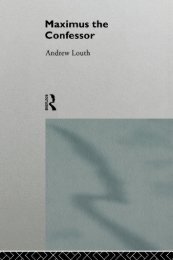Gospels of Thomas and Philip and Truth - Syriac Christian Church
Gospels of Thomas and Philip and Truth - Syriac Christian Church
Gospels of Thomas and Philip and Truth - Syriac Christian Church
You also want an ePaper? Increase the reach of your titles
YUMPU automatically turns print PDFs into web optimized ePapers that Google loves.
(www.metalog.org/files/tpb/sabbath.html).<br />
<strong>Thomas</strong> was discovered in 1945 in Egypt along with more than 50 other ancient<br />
<strong>Christian</strong>, Jewish <strong>and</strong> pagan works that make up a collection known as the Nag<br />
Hammadi Library. The documents, which date from the 4th century BC to the 4th<br />
century AD, were written in Coptic, the language <strong>of</strong> early Egyptian <strong>Christian</strong>s. The<br />
library, including <strong>Thomas</strong>, has been translated into English <strong>and</strong> published in several<br />
scholarly editions. But many scholars feel that <strong>Thomas</strong> should be made available in<br />
a separate volume. ‘I think it's urgent that <strong>Thomas</strong> be published alone in a<br />
paperback edition,’ said Brown.<br />
Unlike the other Nag Hammadi volumes, <strong>Thomas</strong> contains teachings <strong>of</strong> Jesus,<br />
which scholars believe would be particularly valuable for <strong>Christian</strong> readers. Many<br />
students <strong>of</strong> the Gospel <strong>of</strong> <strong>Thomas</strong> believe that its material is potentially <strong>of</strong> more<br />
interest to the general public than the much-ballyhooed Dead Sea Scrolls— except<br />
that it is not as well known.<br />
Many quotations recorded in <strong>Thomas</strong> are similar to those in the <strong>Gospels</strong> that<br />
make up what is known as the New Testament canon— the writings <strong>of</strong> the early<br />
church that eventually came to be accepted as authentic <strong>and</strong> authoritative texts for<br />
all <strong>Christian</strong>s. For example, Saying 90 in <strong>Thomas</strong>, ‘Come unto me, for my yoke is<br />
easy <strong>and</strong> my lordship is mild, <strong>and</strong> you will find repose for yourselves,’ bears strong<br />
resemblance to a familiar passage in Matthew 11:2830.<br />
Recent Scholarly Comments<br />
Henry Barclay Swete, ‘ The Oxyrhynchus Fragment [PapOx 1]’ (lecture delivered to<br />
the Summer Meeting <strong>of</strong> Clergy, the University <strong>of</strong> Cambridge, 29 July 1897): The site <strong>of</strong><br />
Oxyrhynchus ... in <strong>Christian</strong> times ... acquired a reputation as a stronghold <strong>of</strong><br />
Egyptian monasticism.... The Λογια Ιησου are the oracles <strong>of</strong> Jesus, or sayings in<br />
which He reveals the Divine will. The book bears, I think, manifest tokens <strong>of</strong> its claim<br />
to possess this character. It was written in the form <strong>of</strong> a codex, on leaves, not in<br />
successive columns on a roll— a form which seems to have been reserved among<br />
<strong>Christian</strong>s for sacred or ecclesiastical books. Each saying begins with a formula<br />
which indicates its oracular authority.... The reason why λεγει [i.e. ‘x says’ in the<br />
present tense] is appropriate, is that we have before us a fragment <strong>of</strong> a collection <strong>of</strong><br />
sayings which purport to be λογια ζωντα, living oracles <strong>of</strong> the living Lord.... There is<br />
15




